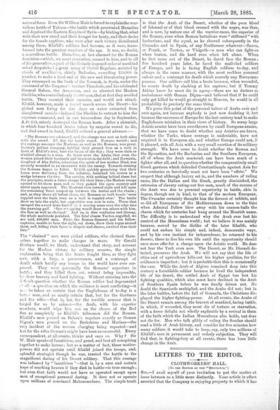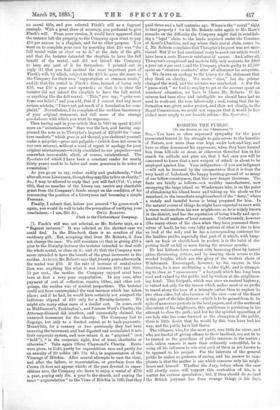LETTERS TO THE EDITOR.
CLOTHWORKERS' HALL.
Ito THE EDITOR OP THE " SPRCTATOR."1
avail myself of your invitation to put the matter at issue between as a little more distinctly. Your article in effect asserted that the Company is enjoying property to which it has no moral title, and you selected Finch's will as a flagrant example. With a great show of accuracy, you professed to give Finch's will. From your version, it would have appeared that the testator left the property to the Company upon trust to pay £10 per annum to a chaplain, and for no other purpose. You went on to complete your case by asserting that 210 was "the fall rental value or close on to it," at the date of the gift, and that the testator intended the chaplain to have the full benefit of the rental, and did not intend the Company to keep any part of it for themselves. I pointed out in reply (1) that you had omitted the most important part of Finch's will, by which, subject to the £10, he gave the rents to the Company for their own " supportation or common needs ;" and (2) that the rental in Finch's time, instead of being only 210, was £30 a year and upwards ; so that it is clear the testator did not intend the chaplain to have the full rental, or anything like the full rental. "This," you say, "quite confirms our belief ;" and you add, that if I cannot find any more serious mistake, " I have not got much of a foundation for complaint." Nevertheless, I do complain of the reckless inaccuracy of your original statement, and still more of the strange vonthatance with which you treat its exposure.
Then having said in your article that in 1880 we spent £5,000 more on "entertainments" than was the fact, and having suppressed the note as to Thwaytes's bequest of 220,000 for "creature comforts" which goes in aid thereof, you sheltered yourself under a misprint—gross and palpable—(which does not occur in our own returns), without a word of regret or apology for your original misstatement—widely circulated to our prejudice—and somewhat inexcusable, albeit, of course, unintentional. The Spectator (of which I have been a constant reader for nearly thirty years) used to be fairer and more generous in its notes of recantation !
As you go on to say, rather rudely and gratuitously, "that after all, even Liverymen, though they may like tolive on charity," dm., I may be allowed to reply that you will find (Vol. V., page 424), that no member of the Livery can receive any charitable grant from the Company's funds, except on the condition of his renouncing the position of a Liveryman and becoming a simple Freeman.
Finally, I submit that, before you proceed "by guess-work" again, you would do well to take the precaution of verifying your
.conclusion.—I am, Sir, &c., OWEN ROBERTS,
Clerk to the Clothworkers' Company.
[1. Finch's will was not selected, as Mr. Roberts says, as a "flagrant instance." It was selected as the shortest case we could find. In the Blue-book there is no mention of the residuary gift. But, accepting that from Mr. Roberts, it does not change the case. We still maintain (a) that in giving 210 a year to the Divinity-lecturer the testator intended to deal with the whole rental, or close on it ; and (b) that the Company were never intended to have the benefit of the great increment in the residue. As to (a), Mr. Roberts says that, twenty years afterwards, the rental was £30. If the rate of increase of rental-value then was anything like what it was between 1870 and 1880, 50 per cent., the residue the Company enjoyed must have been at first a very poor supportation. In any case, after payment of cost of collection, repairs, tithes, and other outgoings, the residue was of modest proportions. The testator could not have contemplated the vast increase which has taken place ; and if he had, he would have certainly not assigned the ludicrous stipend of 210 only for a Divinity-lecturer. We might cite many other cases of a similar sort. In some, such as Middlemore's, Packington's, and Frances West's Charity, the Attorney-General did interfere, and successfully claimed, the unearned increment for the charity. The Company had to disgorge, but only to a limited extent as to back-payments. Meanwhile, for a century or two previously they had been annexing the increment, and had digested and assimilated it into their corporate system, and now return it as " acquired " (not "held"), "in the corporate right, free of trust, charitable or otherwise." Take again Oliver Claymond's Charity. Rents were given, in 1540, partly for superstitious uses and partly for an annuity of 20 nobles (26 13s. 4d.), in augmentation of the Vicarage of Hitchin. After several attempts to oust the vicar, and after the failure, or commutation, or purchase from the Crown (it does not appear which) of the part devoted to superstitious uses, the Company sits down to enjoy a rental of 2790 • a year, paying only 20s. a year to the church, and paying the same " augmentation " to the Vicar of Hitchin in 1888 that they paid three and a half centuries ago. Where is the" moral" right to that property ? Or let Mr. Roberts refer again to Mr. Hare's remarks on the difficulty the Company might find in establishing a "legal" claim to the lands acquired under the Countess of Kent's Charities, and say where their moral claim comes in.
2. Mr. Roberts complains that Thwaytes's bequest was not mentioned. But if we had mentioned every bequest our article would have been a mere Homeric catalogue of names. And, after all, Thwaytes's exceptional and modern folly only accounts for MO a year (at 4 per cent), and the Company pleads guilty to £7,000 spent on "creature comforts," after all allowance for misprints.
3. We do owe an apology to the Livery for the statement that they lived on charity. We wrote "dine," but the printer changed the word, and the mistake was overlooked. 4. For the " guess-work " we had to employ to get at the amount spent on members' education, we have to blame Mr. Roberts. If his returns had been clear and intelligible we should have had no need to work-out the sum laboriously ; and, seeing that the information was given under protest, and then not clearly, to the Royal Commission, we could not suppose that it would be furnished more amply to our humble selves.—ED. Spectator.]



































 Previous page
Previous page